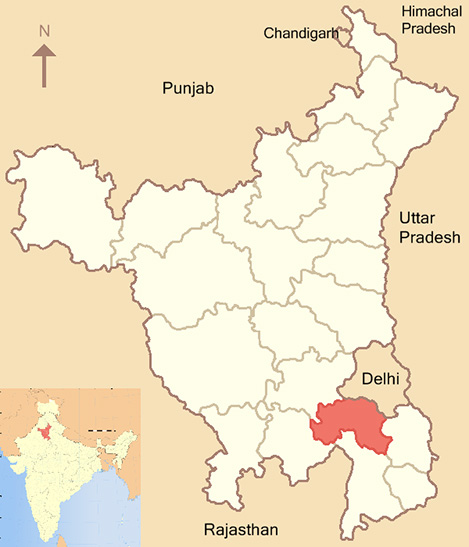
Map of Gurgaon district in Haryana where Friday prayers are being violently disrupted by members of the Sanyukt Hindu Sangharsh Samiti (Photo: Joy1963/WikiCommons)
Sajeda Haider
India’s ruling right-wing nationalist party the Bharatiya Janata Party (BJP) under the leadership of PM Narendra Modi is threatening Muslims Constitutional right to freely practise their religion by supporting a ban on decades-long prayers in public places.
Over the last month Friday prayers in the city of Gurgaon, virtually an extension of New Delhi, are being violently disrupted by members of the Sanyukt Hindu Sangharsh Samiti (SHSS), a group affiliated to the Rashtriya Swayamsevak Sangh (RSS), the BJP’s ideological mentor, which wants a ban on prayers in public places.
There are around 400,000 Muslims living in Gurgaon in the state of Haryana, a new, modern city which has become a hub for many IT companies. However, the city has only 22 mosques and one ‘Idgah’, a large mosque used to cater to hundreds of thousands of Muslims for Friday and Eid prayers.
For decades, Friday prayers have been held in around 100 open-air empty fields along with the 22 mosques with no complaints from locals of other religious communities. Until April 20, that is, when youths from the SHSS broke up the prayers in around 10 public places using threats and violence.
Chief Minister of BJP-ruled Haryana supported the SHSS’s views. “Namaz [prayers] should be held within the precincts of religious places like mosques and idgahs and if there’s a shortage of venues at private places or at home”, said Chief Minister, Manohar Lal Khattar.
However, Muslims complained that they are denied permission by the local government to build more mosques so that they do not have to pray in open spaces.
After three strife-filled Fridays turned public opinion against the ‘namaz vigilantism’ the Haryana government was forced to form a committee to identify police protected public places where Muslims would pray. The committee requested 73 places, but the administration agreed to 23. All the worshippers could not be accommodated and with the onset of Ramadan, the numbers of the congregation swelled further. Not wanting to exacerbate matters mosques are holding Friday prayers in shifts.
Political analysts argue that the ‘namaz vigilantism’ in Gurgaon is merely part of a larger nation-wide RSS policy to deny Muslims their fundamental rights. Despite no past objections, RSS leaders in West Bengal in eastern India demanded Muslims be barred from praying on roads as it caused an ‘obstruction’. At 27 per cent, Bengal has one of the highest Muslim populations in India therefore on Fridays some mosques in Calcutta overflow onto the pavements outside, particularly during Ramadan.
Muslim religious leaders agree that prayers on the road should be suspended if they are causing inconvenience but see a hidden RSS agenda orchestrated to coincide with calculated disturbances in Haryana. “The government must allow new mosques to be built and help in freeing up thousands of mosques which have been encroached upon over the years. That way people will have enough places to pray and will not need to pray on roads,” said Shafique Qasmi, Imam of the Nakhoda Masjid, the largest and oldest mosque in Calcutta.
The Haryana Wakf Board agreed with Qasmi and claimed it has 12,000 properties across the state but nearly 4,000 of them have squatters who cannot be cleared without the government’s help. Coming to the aid of Gurgaon’s Muslims, the Wakf Board has offered 20 of its properties where Friday prayers can be held to ease the current crisis.
However, the row has triggered a national debate with many ‘secular’ people arguing that if prayers cannot happen in public places then the same law should also be applied to Hindu religious festivals which also take place on the streets. “If namaz, which is a momentary obstruction of a road, cannot happen, then what about the many temples all over India which are built right on the road or pavement. They are permanent obstructions,” said Javed Khan, a minister in West Bengal.
Muslims have accused PM Modi of remaining silent on the subject, allowing the row, like others before it infringes on Muslim rights, to fester. With general elections just a year away, the BJP is looking for issues to polarize voters along religious lines. They are hoping that if they can mobilize public opinion in demanding a ban on prayers in public places then this would be a perfect election plank to win votes.